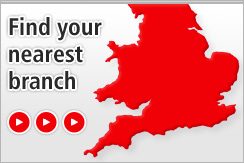Latest fraud and scams updates
The Financial Services Industry has recently seen an increase in the number of customers targeted by fraudsters with financial scams which have resulted in a loss to both the bank/building society and to the customer.
This page aims to highlight the sort of current scams that you should be aware of and provides guidance on what you can do to reduce the risks of becoming a victim of fraud.
Fraud scams are designed to deceive you into handing over your money or personal details, to gain access to your money or commit fraud in your name. Below is an explanation of various types of scams currently being used by fraudsters.
Telephone scam
A swindler calls a consumer pretending to be either their bank or the police, and says that the consumer's card has been compromised or there is a problem with their account. They then advise the victim to call the bank, but stay on the line and pretend to be a bank representative, persuading the victim to transfer funds, withdraw money or reveal security information.
Courier scam
This is similar to the telephone scam, but after gaining your trust the fraudster will advise that they will send a courier to your home to collect the card and take it to the victim’s bank/building society or to the police.
Phishing scam
This scam involves emails being sent with links to fake websites to trick people into entering person details or account information. Embedded links within the message can direct you to a hoax website where your login or personal details may be requested. You may also run the risk of your computer or smartphone being infected by viruses.
Once your personal details have been accessed, criminals can then record this information and use it to commit fraud crimes such as identity theft and bank fraud.
SMS phishing scam
Here a customer receives a text message that appears to be sent from a bank or service provider, when in fact it comes from a fraudster. These scams often direct you to visit a website or call a phone number. If you dial the number, you’ll be asked for sensitive information like a credit card number. If you visit the website, your computer may be infected with malware.
While most people are familiar with email phishing scams, they're less sceptical when receiving SMS phishing messages.
Advance fee fraud
Fraudsters target victims to make advance or upfront payments for goods, services and/or financial gains that do not materialise.
Competition/Lottery scam
The fraudster contacts you to tell you you’ve won a large sum of money in an international lottery, sweepstake or other prize draw.
If you respond to the fraudster, you’ll be asked to supply personal information and copies of official documents, such as your passport, as proof of identity. The fraudsters can then use this information to steal your identity.
Once you have provided your personal information, the fraudsters will ask you to pay various fees – for example: taxes, legal fees, banking fees etc. – so that they can release your non-existent winnings.
Boiler Room scam
Boiler Room scams involve selling worthless or overpriced shares are often run from “boiler rooms” full of sales people using high pressure, unfair and dishonest cold calling techniques. Fraudulent approaches can also come by email, post, word of mouth, at a seminar, in the press or on-line.
Share scam
If you already own shares in a company you may receive a call from someone offering to buy them, usually at a higher price than their market value.
This might sound like a great deal, but will likely come with a request for money up front as a bond or other form of security, which the scammers say they will pay back if the sale does not go ahead. This is probably a scam where you pay money upfront but never hear from them again.
Dating scam
This is a fraud when you think you’ve met your perfect partner online, but they aren’t who they say they are. Once they’ve gained your trust, they ask for money for a variety of emotive reasons.
Once the fraudsters are confident that you have enough sympathy and desire for them, they will tell you about a problem they are experiencing and ask you to help out by sending money.
For example:
- They’ve arranged to visit you but need money to pay travel costs, visa costs etc. Or they’ve paid for a plane ticket which is then stolen
- A family member or someone else they are responsible for is ill and they need money for medical treatment.
Once you send them money, the fraudsters will keep coming back with more reasons to send them money.
Work at home and business opportunity scam
A work or business opportunity is advertised in a local newspaper, magazines, shop windows, on lamp posts, on the web or in a letter which claims to offer a quick way to make a lot of money from home without having any qualifications, skills or expertise. The catch is that before starting any work the victim has to pay money up front. This is in the form of a registration fee or to buy goods. After this money has been paid the victim either finds that there is either no work to do or that they will not be paid for any work done.
Mystery shopper scam
Where you unwittingly commit the offence of money laundering on behalf of the fraudster.
This scam has a few different forms:
- You open an account and accept money in and then transfer the money back to the fraudster.
- You receive a cheque to deposit to your account and then pay cash via Western Union (to the fraudster) to test Western Union service. The cheque is then identified as fraudulent and bounces after you have sent funds.
Inheritance scam
You are told that you are due inheritance from long lost relative abroad and just need to attend a hearing tomorrow. When you can’t attend due to short notice, they ask you to send money to pay for an official to attend on your behalf. After sending the money it transpires that the inheritance doesn’t exist.
Contact us
If you are concerned that:
- you may have disclosed any confidential information to an unknown third party
- you believe a transaction on your account is fraudulent
- you become a victim of identity theft
- you have any concerns about security
Please contact us immediately by phoning 0345 850 4041
More information
For more information on current fraud scams, please visit the following websites:
Chelsea Building Society and the Chelsea are trading names of Yorkshire Building Society. Yorkshire Building Society is a member of the Building Societies Association and is authorised by the Prudential Regulation Authority and regulated by the Financial Conduct Authority and the Prudential Regulation Authority. Yorkshire Building Society is entered in theFinancial Services Register and its registration number is 106085. Principal Office: Yorkshire House, Yorkshire Drive, Bradford BD5 8LJ.
References to 'YBS Group' or 'Yorkshire Group' refer to Yorkshire Building Society, the trading names under which it operates (Barnsley Building Society, the Barnsley, Chelsea Building Society, the Chelsea, Norwich & Peterborough Building Society, N&P and Egg) and its subsidiary companies.
Buy to Let mortgages are not regulated by the Financial Conduct Authority
This site is intended for UK Residents unless otherwise stated. All communications with us may be monitored/recorded to improve the quality of our service and for your protection and security.
*Calls to 0800 numbers are free of charge from a landline or mobile. Calls to 03 numbers are charged at the same standard network rate as 01 or 02 landline numbers, even when calling from a mobile.
Get in touch with us:
- Call us:
http://www.thechelsea.co.uk/contact/index.html - Find a branch:
http://www.thechelsea.co.uk/contact/branch_finder.html - Manage your accounts online:
http://www.thechelsea.co.uk/security/online_help.html


